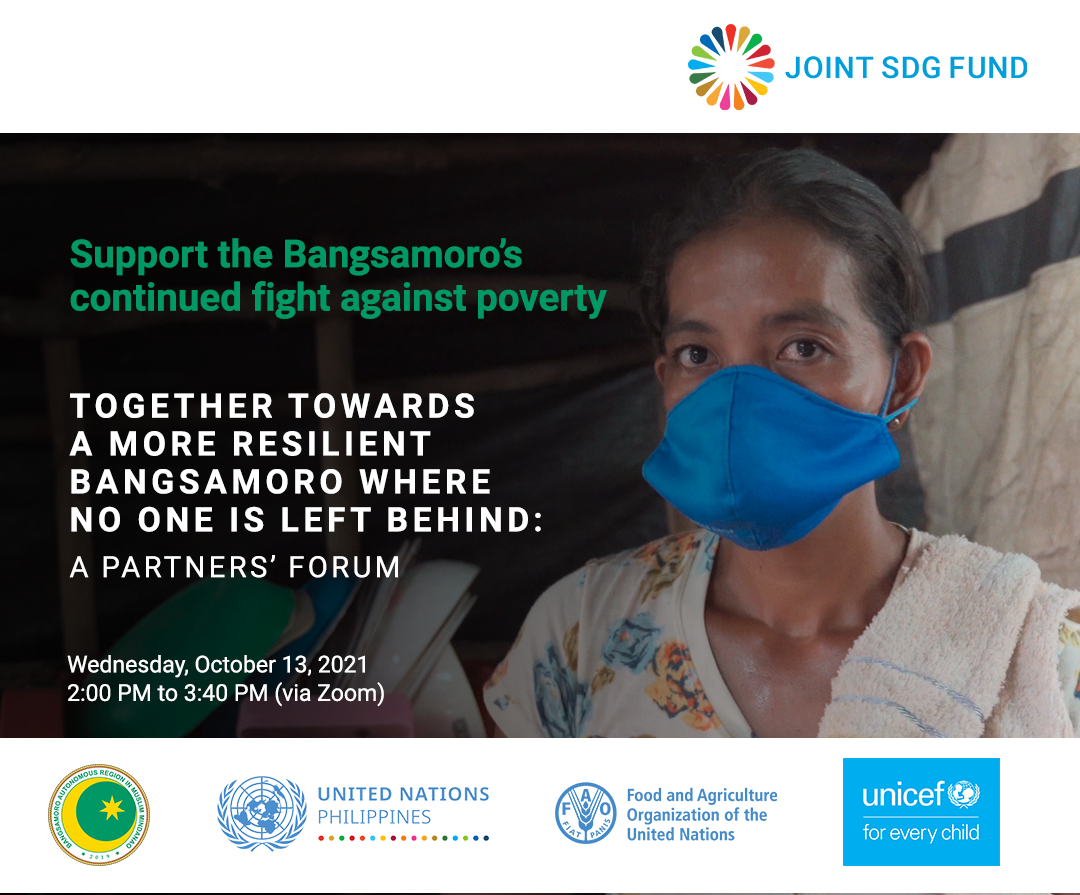COTABATO CITY – Through a virtual forum on Wednesday, Oct. 13, the Bangsamoro Government and the United Nations (UN) celebrated the achievements and results of their joint programme on “Ensuring inclusive and risk-informed shock-responsive social protection resulting in more resilient communities in Bangsamoro Autonomous Region in Muslim Mindanao.”
“We are celebrating the important results achieved by this joint programme which reflects the effective collaboration between the BARMM government and the UN family,” said Gustavo Gonzalez, UN Resident Coordinator in the Philippines.
“I would like to thank BARMM authorities for their trust, and I also commend the UN agencies leading this programme, for pulling their best global expertise in social protection to support the Bangsamoro people,” he added.
Launched in August 2020, the programme aims to address the risks and vulnerabilities that the Bangsamoro people, especially the poorest, most vulnerable, and marginalized, face in times of natural and human-induced disasters that perpetuate the cycle of poverty.
BARMM key ministries and the UN’s Food and Agriculture Organization (FAO) and United Nations Children’s Fund (UNICEF) are implementing the programme which is funded by the Joint Sustainable Development Goals (SDG) Fund – an international multi-donor and multi-agency development mechanism created in 2014 by the UN to support sustainable development activities through integrated and multidimensional joint programmes.
Chief Minister Ahod Ebrahim said it was a challenge for BARMM to build a new regional government while battling the Covid-19 pandemic. “Fortunately for us, we have development partners across the world that are there; equipped and prepared to lend a helping hand to the infant bureaucracy,” he said.
“This Joint Programme served as a catalytic investment for the poorest and most vulnerable population in BARMM to be able to respond to natural and human-induced shocks and stress through an accessible, comprehensive social protection system,” said Ebrahim.
“Thank you very much to Mr. Gustavo Gonzalez, the UN Philippines Family, and to all our development partners here today for the things that you do for us and for believing in the Bangsamoro cause,” he added.
According to Minister Raissa Jajurie, the Ministry of Social Services and Development (MSSD) is implementing several social protection programs that were designed to reduce poverty and vulnerability by enhancing people’s income generating capacities, diminishing their exposure to hazards and loss of income.
However, she said the ministry faced challenges in implementing the programs such as the limitation of resources and the processes of registration, monitoring, and evaluation.
“This is why the ministry started developing a poverty and disaster registry that will enable the flow and management of information, to ensure more responsive, suitable, and inclusive distribution of resources while also ensuring efficient and effective delivery of social protection programs,” Jajurie said.
The Joint Programme came at the right time, she said, as it provided MSSD with technical inputs and guidance in improving the registry and the management information system.
Furthermore, Jajurie said the programme was also able to provide additional resources and partnerships. She said the Australian Government Department of Foreign Affairs and Trade (DFAT) provided resources needed to scale up the programme and boost the Covid-19 response in the region.
“With the funding from European Union Civil Protection and Humanitarian Aid (ECHO), we were able to support emergency cash transfers to additional 2,800 families who were excluded from the national government’s social amelioration program (SAP) last year,” said Jajurie.
On the other hand, UNICEF Mindanao Chief Andrew Morris shared that they have been contributing in the Joint Programme by supporting MSSD’s reform in their social protections systems, such as the development of the poverty registry.
Morris also mentioned that in 2020 UNICEF provided additional cash assistance to the MSSD for around a thousand poor families, with children aged under two years, who were not included in the SAP nor in the national Pantawid Pamilyang Pilipino Program (4Ps).
“For the remainder of the year, we will be further supporting the MSSD to implement cash transfers for around 4,000 families in the most conflict-affected municipalities in Maguindanao,” Morris said.
Meanwhile, FAO partnered with the Ministry of the Interior and Local Government (MILG) and the Voluntary Services Overseas (VSO) to survey 1,680 households across BARMM, including the Special Geographic Areas. The overlay of this information allows BARMM to design risk informed and shock responsive social protection that is well targeted and relevant to the different contexts of the region.
Furthermore, FAO together with the Bangsamoro Planning and Development Authority (BPDA) reviewed the Bangsamoro Investment Development Plan to provide a training platform for key ministries in making and implementing relevant policies.
Also present during Wednesday’s forum were BPDA Director General Mohajirin T. Ali, MILG Minister Naguib Sinarimbo, ECHO Head of Office Arlynn Aquino, FAO Country Representative Kati Tanninen, Counsellor for Development Thanh Le PSM of the Australian Embassy in the Philippines, and First Vice President Jonathan Batangan of the Philippe Jones Lhuillier, Inc. Group of Companies. (Bangsamoro Information Office)
![]()








